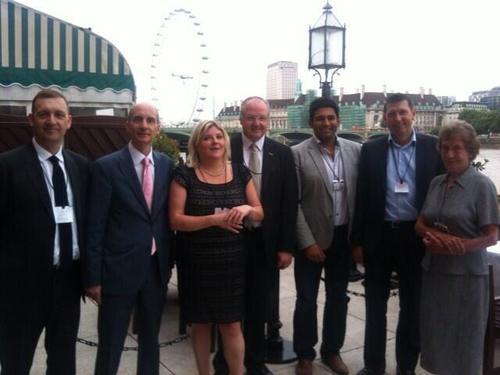
But business relations have soured. Both on economic management and red tape, the Tories have secured the high ground. Not a single FTSE 250 chief executive backed Labour at the last election.
Days before Labour’s conference this week Downtown brought a couple of dozen members together for an audience with front bench heavyweight Andy Burnham MP at Manchester Science Park (pictured above, with Rowena Burns from MSP). One of the points I put towards him was the shift going on our cities and business parks and Labour’s need to engage better with businesses beyond the square mile of the City of London.
The demographic of Britain is changing. The last couple of years has seen record levels of new company formations and new businesses. According to the Start-Up Britain Tracker 382,792 new businesses have been started this year. That enormous figure may mask a multitude of different stories – it includes one-man bands, sole traders, kitchen table eBay traders, shell companies as well as a fully fledged companies with dreams of world domination.
What they all represent is that thread of aspiration through British society. A desire to get on, improve one’s lot and make money.
 I wanted to know if there was room for any of that in Andy Burnham’s radical ‘aspirational socialism’ agenda which underpinned his earlier leadership bid. We have been comfortable so far with the soundings we have had with Lord Adonis as he embarks upon his Growth Review.
I wanted to know if there was room for any of that in Andy Burnham’s radical ‘aspirational socialism’ agenda which underpinned his earlier leadership bid. We have been comfortable so far with the soundings we have had with Lord Adonis as he embarks upon his Growth Review.Too often, Labour’s left leaning rhetoric has betrayed a lack of trust and empathy with the wealth creating classes, focusing firmly on taxes, fat cats and if you close your eyes and listen to Ed Balls spit the word out – “millionaires”.
Many of the 382, 792 will not become the “millionaires” that Ed Balls thinks were undeserving of a tax cut from 50 per cent to 45 per cent once they earned £150,000 a year. But they’re not stupid either. They hear that and think – he’s going to come after me once I make a bit of money for myself. They might not pack it in, but they’ll switch off when Labour come calling.
Ed Miliband was at least right in his instincts this week when he identified an opportunity to make a Labour pitch to be the party of small business. Small companies are often the forgotten and downtrodden underdog in a supply chain, the victims of cartels and stitch ups, shut out from the closed shops of procurement processes by bureaucracy and a high bar for admission to government frameworks.
 A policy to cut business rates was a step in the right direction. So too is Shadow Business Secretary Chuka Umunna’s imaginative lifting of the Small Business Saturday project from America, but there is still a great deal more work to be done to convince anyone in a business that the state is on their side, whatever the party.
A policy to cut business rates was a step in the right direction. So too is Shadow Business Secretary Chuka Umunna’s imaginative lifting of the Small Business Saturday project from America, but there is still a great deal more work to be done to convince anyone in a business that the state is on their side, whatever the party.Take what Chuka Umunna told the Daily Telegraph this week: “We want to celebrate companies that have good business models, which promote long-term sustainable value creation, who value their people and see business as part of society. During our time in government, we weren’t always discerning about the kinds of business models and practices we want to see.”
I’d like to know this: Where is Labour placing the tidemark on these models? No, OK, putting kids up chimneys is off, but cold calling? Lending money? Private healthcare? Entrepreneurial people tend to spot opportunities better than government. They should be supported when they do so. That support should be unconditional, otherwise the aspiration isn’t to support small business at all, just to support cool people we like, and the rest of you can just pay your tax and shut up.
via Tumblr http://michaeltaylordowntown.tumblr.com/post/62320110904

No comments:
Post a Comment